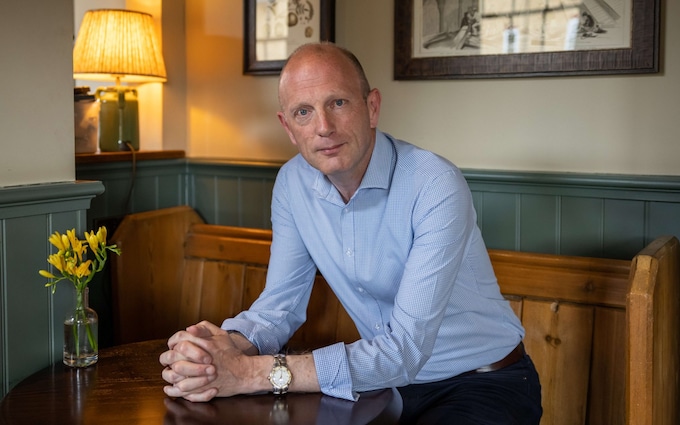Peter Drury on the commentator’s art: ‘Words can be my worst enemy’

Exclusive: Much-loved commentator on that night in Rome, Sergio Aguero’s goal and not watching football as a child

From the frenzy of the Olympic Stadium in Rome to a quiet Hertfordshire pub, Peter Drury is talking me through what happened that night four years ago when he uttered his famous commentary about Roma rising from their ruins and a goal scored by a Greek god.
Drury’s is an unmistakable voice for those who have listened to him on the Premier League Production (PLP) coverage around the world, the Champions League on the US network CBS Sports and many other broadcasters as well as the Pro Evolution Soccer game. The only difference today, as we sit in his local, is that the rich, sonorous voice is operating at a much lower volume than on matchday, eager not to attract attention among the lunchtime crowd.
We are discussing something bigger as well: football and the words used to describe it. What an audience wants these days with games played every night of the week, games on the red button, instant goal clips. Also, how one man’s 32-year career behind the microphone has – much to his surprise – struck a chord with a new generation.
That 2018 tie when Roma came back against Barcelona to win 3-0 in the Champions League quarter-final second leg and triumph on away goals, saw Drury conjure some of his most famous lines. He was carried, he says, by the drama on the pitch and was also, he observes, experiencing an unusual lack of inhibition. “Manchester City were playing Liverpool that night and I was in the Olympic Stadium thinking ‘Nobody is watching this one’”.

His view was simple, and is one that has always informed his work. Every game is to be relished, or as Drury puts it for that night of April 10, 2018, “Messi is playing, and if you’re there it’s good to be alive”.
“There was no pressure on that game at all,” he adds. “And so a series of words flew out of my mouth that I would not have allowed to fly out of my mouth if I thought everyone was listening.”
He is a self-effacing, thoughtful man with a natural shyness. He does not want to be a television personality and required some persuasion to be interviewed. Yet that night in Rome, and on many others recently, he hit upon something fundamental about the nature of commentary. That, in great moments, an audience wants their wonder reflected back at them. When unexpected things happen on a football pitch it requires a voice that matches the emotions and significance of the occasion.
Producing it in the moment, when there is no scope to edit or refine, is something else altogether. How does it come together? “You are asking me,” Drury says, “to deconstruct something that I have never really constructed. It just sort of happened.” But we try anyway to figure out what makes for good commentary – and why people get so annoyed when they perceive it to be done wrong.
In Rome that night, Barcelona were 3-1 up from the first leg. “Nothing was going to happen,” Drury says. “It didn’t matter. Then when Roma got to within one goal I thought: ‘If they score again this becomes something … we are in big story territory’. [Kostas] Manolas, a centre half, who shouldn’t be scoring, does so with a near-post flick with his number facing away from me and in the first instance I didn’t know who had scored.
“Any commentator will tell you in those circumstances you have to find a way of filling the gap until you know. It’s a trick of the trade. So that was where ‘Roma have risen from their ruins’ came. Covering for the fact I had no idea who had scored the goal. Then we got a close-up of Manolas and I thought, ‘What do I know about Manolas? He’s Greek’. The rest was just slightly weird. I’m sure anyone with any academic depth would destroy it.”
Except the audience loved it. There were the short sentences of the Hollywood movie trailer, and between them the epic Druryian pauses. There was the nod towards the classical. All without detracting from the natural soundtrack of the roaring Roman crowd. This was not meant to happen, as Drury himself would say, but happen it did. And Drury’s commentary went viral.
‘Why wouldn’t you prepare?’
He had been a favourite before then, especially alongside Jim Beglin for viewers of the PLP coverage that many international broadcasters take as standard. This season Drury will be the key voice in NBC Sport’s US coverage of the Premier League. There will doubtless be more Drury classics like his vignette for the return to Manchester United of Cristiano Ronaldo against Newcastle United in September. This was a different skill: capturing a unique mood of anticipation as the prodigal son returned.

Drury is fanatical about his preparation but that does not extend to scripting anything for the period between the first and final whistle. “Whatever you write won’t happen as you imagine it,” he says, “it won’t quite be right, and what’s more it sounds written and inauthentic. But anything that happens before is fair game.
“So [for Ronaldo’s return] it was blindingly obvious to me that when the teams were in the tunnel, the close-up all the way out into the middle would be of Ronaldo. You know you have 25 seconds of Ronaldo. Why wouldn’t you prepare?”
Even then he does not read out a script but scribbles down a series of notes in handwriting he says is so bad he would not be able to read it verbatim even if he wished to do so. “I have to try to decode it, so I hope on a good day that makes it both prepared and spontaneous.”
‘Words have been my best friend’
Drury, 54, never watched football live as a child. His late father William was a Church of England vicar in Kent – a rugby and cricket man and not much interested in football. When young Peter was not singing in the choir at a wedding on a Saturday afternoon he was at home captivated by the then BBC Radio 2 commentaries of the late, great Peter Jones and Bryon Butler. As a consequence, he would commentate on anything and everything. That included school games, before he broke into the team as a goalkeeper. Even the view from his bedroom window of his father walking up the road every morning with the newspaper was, he says, “commentated on like the Olympics 200 metres final”.
I offer the theory that the children of preachers often inherit a facility with words – and many have become famous actors, politicians, musicians, activists. Drury counters that his father was a very “intense, earnest, academic” clergyman and that was reflected in his sermons. Peter sat in church through many of them, and he can say definitively that his commentary style owes more to Peter Jones, Barry Davies and Brian Moore than the Father, the Son and the Holy Ghost.

Druy is the son of a Church of England vicar in Kent Credit: Hollie Adams
One of the lines the internet attributes to him upon a particular Manchester City substitution, “Silva for Jesus, an exchange of which Judas would be proud”, he says he never uttered. Not because he is sensitive about his own rather casual Christianity but because he is respectful of the beliefs held by others.
“I do love the words,” he says. “Words have been my best friend. And sometimes my worst enemy. There are times when I don’t need anyone to tell me, ‘Come on you have ladled it on a bit much’. That’s fair enough. When I was writing essays as a 15-year-old I remember my teacher saying ‘Drury, you have written a page there and you have said nothing’.”
Where do the words come from? He does the crossword every day but is not a voracious reader. He did get through “Tess of the d’Urbervilles” in lockdown, the Thomas Hardy classic which is only slightly less depressing than the recent experiences of the average Manchester United fan. He studied Latin and Ancient Greek at school and found himself more interested in the construction of the words than the stories themselves.
As I probe for this secret wellspring of language from which his instant compositions flow, what becomes clear is something else. That Drury is a naturally eloquent man whose sheer unfettered love of the game is what drives these moments. Those big commentaries in Rome or Manchester or Johannesburg are a reflection of his very real delight at being present.
He recalls it from his first days watching regular live football at Boothferry Park, when he was a Hull University politics student in the Eighties. “Because I was late to it, I was more thrilled by it,” he says.
That thrill has never gone away. Then, he would turn up at the ground at 1pm to savour it all, and is delighted that broadcasting requires him to do the same. Every game matters, he feels. At every stadium there might be someone who is watching for the first time, or the only time.
“When it’s 10 minutes before the end and 0-0, I hear a commentator say how tedious it is,” he says, “but if you are a fan of a football team these next 10 minutes are make or break for your weekend. You’re either flying or desperate. That’s not dull. It could be a poor game – but it’s not dull.”
He is haunted by the prospect of uttering the wrong goalscorer’s name, the commentator’s nightmare. It is his PLP commentary from that famous final day at the Etihad Stadium in 2012 that is as well-known around the world as Martin Tyler’s is within the English game.

He says the gantry then in use was so high that he was just relieved to see it was Sergio Aguero who had scored when the monitors revealed the close-up.
Drury does not want to be anything other than a support act for the game he loves. He is not on social media and nor does he ever intend to be. He finds it hard to listen back to his commentaries and reviews them every so often just to note repetitions to be avoided in future. In the car he likes to put on the local radio commentary and says the standard is often much higher than people might expect. It makes him reflect on the breaks he has had, from a start at BBC Radio Leeds in 1990 to the launch of BBC Radio Five Live four years later, all of which has shaped such a distinctive voice.
As for advice to those who might follow in his footsteps, he says simply that a good commentator should not pursue notoriety or fame but always strive to reflect their own authentic reaction. In short: “Do it because you love football and you love the language.” His best advice, he says, came from the oldest of his three sons, the day after that commentary from Rome.
“He said, ‘Dad, that was great, but you can’t do that again for a while now’. He was absolutely right. The whole thing is about authenticity. If you are pretending to do it because you want to show off then very quickly you are gone.”

